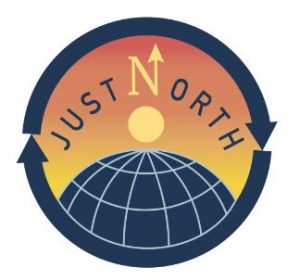Privatized fishery management schemes, alongside other cultural and social changes, have led to a high average age in some fisheries, where youth and newcomers are not meaningfully present in the industry. This research explored the current and future opportunities and constraints for youth and newcomers in Icelandic fisheries, which are managed by an Individual Transferable Quota system. Data were collected through participant observation and 25 semi-structured interviews with key individuals in fisheries.
JUSTNORTH
 Global climate change has launched intense speculation on Arctic resources. Increasing geopolitical tensions among some of the Arctic states increases the importance of respecting different value systems while finding common values to help strengthen the links between Arctic and non-Arctic entities. Significant practice and policy gaps in existing Arctic economic activities have led to development that is unsustainable.
Through understanding current practices of development in the Arctic through the lens of 18 case studies, JUSTNORTH aims to develop conceptual frameworks, indices and a negotiation tool, for reconciling multiple ethics and value systems. These will provide a cornerstone for determining the viability of economic activities in the Arctic, as well as clarify policy, legal, and regulatory pathways for implementing ethic-based decision-making principles.
Global climate change has launched intense speculation on Arctic resources. Increasing geopolitical tensions among some of the Arctic states increases the importance of respecting different value systems while finding common values to help strengthen the links between Arctic and non-Arctic entities. Significant practice and policy gaps in existing Arctic economic activities have led to development that is unsustainable.
Through understanding current practices of development in the Arctic through the lens of 18 case studies, JUSTNORTH aims to develop conceptual frameworks, indices and a negotiation tool, for reconciling multiple ethics and value systems. These will provide a cornerstone for determining the viability of economic activities in the Arctic, as well as clarify policy, legal, and regulatory pathways for implementing ethic-based decision-making principles.
Project details
- Project title: “Toward Just, Ethical and Sustainable Arctic Economies, Environments and Societies”
- Funding scheme: European Union Horizon 2020 Programme (EU H2020, Grant agreement ID: 869327)
- Duration: 3 years (1 June 2020 – 30 November 2023)
- Project coordinator: Uppsala Universitet, Dr. Corine Wood-Donnelly
- Project website: www.justnorth.eu/
Atlantic salmon fishing in northern Fennoscandia is part of controversial ecological, sociocultural, legal, and political questions. This paper presents a study of landscape justice as perceived by stakeholders who practice, manage, and govern traditional, household, and recreational salmon fishing on northern Finland’s border rivers, Tornio (Torne) and Teno (Tana).
This chapter addresses what theories of justice may help further our understanding of injustices in the Arctic. The purpose is to critically discuss the baseline for a Forstian transnational theory of justice and its applicability to the Arctic, primarily the Arctic Council.
The Arctic is a political landscape in development, and it is subject to multiple and often competing claims of sovereignty. Although situated at the margins of territorial governance of the Arctic states until recent decades, the region has experienced rapid transformations, not least in its governance arrangements.
This chapter considers what might be deemed relevant normative standards when taking responsibility for the effects of rising global temperatures on the territories and communities of the Arctic. Are globally produced harms chiefly the responsibility of territory-specific communities in terms of their dire effects, as is often assumed?
Corporate social responsibility (CSR) is the primary mechanism through which private businesses seek to establish their sustainability credentials (Rendtorff, 2019; Saeed et al, 2021). It is supplemented recently with environmental, social and governance investment frameworks (Pedersen et al, 2021).
Several years after the signing of the Paris Agreement, oil and gas production continues at a fast pace despite a near global recognition of the ongoing energy transition away from fossil fuels (IEA, 2021a, 2021b). The increasing demand for oil and gas caused by the post-pandemic lockdown economic recovery threatens the momentum gained by the energy transition.
A growing interest in Arctic resources leads to increased pressure on local authorities to accept new industrial projects in their areas. This includes mining, petroleum, wind energy and less mature technologies like hydrogen and ammonia production.
Throughout the centuries, people have been keen to find and discover new areas and exploit the natural resources associated with them. According to Margaret Kohn and Kavita Reddy (2017), the term colonialism describes the process of European settlement and political control over the rest of the world, including the Americas, Australia and parts of Africa and Asia.
Arctic communities must negotiate locally, regionally and with external actors on how to make the best use of the human and natural resources in the region. This is against the backdrop of increased globalization, climate change, high demand for the region’s mineral resources, and increasing local demand for improved living conditions and sustainable livelihoods.
- 1
- 2
